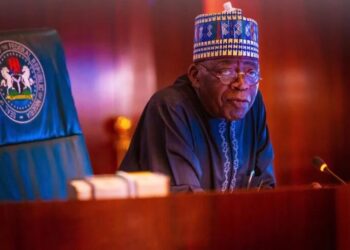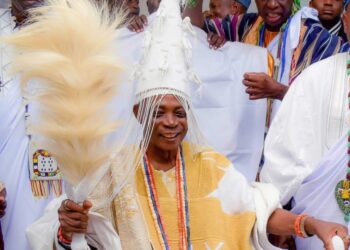In most democratic states, there is always the tendency for citizens to assume, though erroneously, that the exercise of the rights guaranteed under the Constitution is absolute and without limit.
Buoyed by such reasoning, some citizens are often tempted to make demands, ranging from the unusual to the absurd, believing that it was within their democratic rights to so act.
Such was the recent case of the 2007 presidential candidate of the African Democratic Congress (ADC), Patrick Okedinachi Utomi (Pat Utomi), who, in his assumed rights to freedom of expression, association and political participation, announced plan to establish what he called a shadow government or cabinet.
Utomi went to the extent of allocating portfolios, in his so called alternative government, to some of his associates before the Department of State Services (DSS) took the initiative to approach the court to challenge the legitimacy of the adventure by Utomi and his associates.
The suit
The announcement by Utomi about his planned shadow government attracted huge reactions, with many accusing him of acting to undermine the current federal administration and, by extension, the country’s democracy.
While many called for his arrest and prosecution, others, who share his perspective, argued that he was acting within his democratically guaranteed rights.
Rather than joining the fray, as the agency statutorily empowered to safeguard the internal security of the country and prevent any threats to the lawful authority of the Federal Republic of Nigeria and Its constituent institutions, the DSS decided to approach the court for its intervention.
On May 13, 2025 its team of lawyers, led by Akinlolu Kehinde (SAN), lodged a case at the registry of the Federal High Court in Abuja.
In the suit, marked: FHC/ABJ/CS/937/2025, with Utomi listed as the sole defendant, the plaintiff raised two questions for the court’s determination and prayed the court for three principal reliefs.
The questions are:
Whether, by virtue of sections 1(1), 1(2), and 14(2)(a) of the Constitution, any person or group of persons, including the defendant, can lawfully establish or operate a “shadow government” or any parallel governmental structure not recognized by the Constitution.
Whether the defendant’s actions and public declarations regarding the formation of a shadow government” constitute an attempt to usurp or exercise governmental powers outside the constitutional framework, thereby contravening the provisions of the Constitution.
The reliefs
A declaration that, under sections 1(1), 1(2), and 14(2)(a) of the Constitution, the establishment or operation of any governmental authority or structure outside the provisions of the Constitution is unconstitutional, null, and void.
A declaration that the defendant’s plan to establish a “shadow government” or “shadow cabinet” is unconstitutional and amounts to an attempt to create a parallel authority not recognized by the Constitution.
An order of perpetual injunction restraining the defendant, whether by himself, his agents, privies, or any other person acting under his authority, from further taking any steps towards the establishment or operation of a “shadow government, “shadow cabinet” or any similar entity not recognized by the Constitution.
The plaintiff’s case
The DSS stated that, through intelligence and constant monitoring, it discovered that Utomi announced the purported establishment of a shadow government or shadow cabinet with other persons as ministers.
It contended that the shadow government is an unregistered and unrecognized body claiming to operate as an alternative government contrary to the provisions of the Constitution.
The plaintiff stated that the defendant announced that the formation of the shadow government is with the intent to challenge the legitimacy of the democratically elected government of the country.
It expressed concern that such a structure if left unchecked may incite political unrest, cause inter-group tensions and embolden other unlawful actors or separatist entities to replicate something similar.
The DSS stated that Utomi’s actions were capable of usurping the powers of the executive as enshrined in the Constitution, adding that despite the Federal Government’s efforts to engage him to dissuade him from his path, Utomi allegedly remained defiant.
The plaintiff stated that Utomi’s activities and utterances in establishing and promoting a shadow cabinet were capable of undermining the authority of the legitimate government and inciting political instability.
The DSS explained that its reason for approaching the court was for its judicial interpretation on whether Utomi’s “actions cross the constitutional boundary into conduct that is potentially subversive, seditious and unlawful.”
Utomi’s defence
In his defence, Utomi, who contested the presidential election in 2007 under the platform of the African Democratic Congress (ADC), described himself as a Professor, accomplished author, politician and an entrepreneur.
Utomi stated that the Big Tent Association (BTA), under which himself and others in shadow government project were operating, is a registered association that prides itself with shadowing policy activities.
He however claimed that the group did not claim to operate as an alternative or parallel government, adding that the establishment of the shadow cabinet is consistent with the spirit and letters of the Constitution.
Utomi also stated that the formation of shadow cabinet is a common practice globally and it refers to a legitimate civic and political practice where opposition parties or groups form cabinets-in-waiting to provide oversight, articulate policy alternatives and prepare for democratic transition.
He equally stated that Section 14 of the Constitution allows the nation’s citizens to participate in government and that citizens have a right to express themselves as well as associating with others.
Utomi denied that his actions constitute an usurpation of executive powers and that the shadow government did not constitute a threat to national security. He prayed the court to dismiss the suit.
Utomi, who was represented by Mike Ozekhome (SAN), also filed a notice of preliminary objection, with which he challenged the plaintiff’s right to institute the suit (locus standi) and the jurisdiction of the court to hear and determine the suit.
How court aborted Utomi’s plot
In determining the case, the trial judge, Justice James Omotosho formulated three issues for determination. They are:
Whether the plaintiff has disclosed a reasonable cause of action under the National Security Agencies (NSA) Act to activate the jurisdiction of the court.
Whether the formation or declaration of a shadow government or shadow cabinet is recognized under the country’s Constitution.
Whether the filing of the suit by the plaintiff violates or threatens to violate the fundamental rights of the defendant.
On the first issue, Justice Omotosho faulted the defendant’s argument that his actions related to civic engagement and formation of shadow government, which has nothing to do with internal security.
The judge held that the DSS, an agency saddled with the task of maintaining internal security in the country under the NSA Act, was right to have sued to stop the actions of the defendant which threaten national security.
Upon a closer examination of the originating processes, Justice Omotosho proceeded to hold that the plaintiff’s case “as presently couched, discloses a reasonable cause of action against the defendant.”
He added that the supporting facts show a link between the actions of the defendant and the internal security of Nigeria.
The judge said: “As stated earlier, a reasonable cause of action does not necessarily mean a suit which will succeed, but one which discloses facts upon which the court can proceed with the suit.
“Consequently, a reasonable cause of action has been disclosed against the defendant and this court will assume jurisdiction over the suit.”
In resolving the second issue, Justice Omotosho held that, as against the case in parliamentary system of government, which recognizes the idea of a shadow government, Nigeria operates a presidential system that has no provision for such an alternative arrangement.
The judge added that assuming the country was practicing the parliamentary system, Utomi and his associates were still not qualified to form a shadow government since they are not elected members of the parliament, who are in the opposition.
He noted that from the fact before the court, Utomi is alleged to have made public declarations setting up a shadow government under the umbrella of a registered entity known as the Big Tent Association, an allegation that he (Utomi) admitted in his counter affidavit (one of the documents he filed in court).
The judge noted that there is no provision in the entirety of the Nigerian Constitution or any other statute which allow for shadow government or shadow cabinet.
“Not only in Nigeria, even other Presidential systems, such as the United States of America, where we copied our presidential system, there is no space for shadow government or shadow cabinet.
“Any opposition party do not have the right to set up a parallel government. The opposition can only criticize the government and hope to convince the voting public to vote it into office in subsequent elections,” the judge said.
The judge acknowledged the argument that the shadow government project was still in its planning stage, but held that if allowed to mature, Utomi and his associates’ actions could lead to anarchy and a break down of law and order.
Justice Omotosho said: “This court takes the view that a reasonable man on the streets of Nigeria is more likely to see the shadow government as being an usurpation of executive powers.”
He said the case is even made worse by the fact that the strange idea of a shadow government in a presidential system is being promoted by a person, who once contested election for the office of the President of the country.
The judge added: “Allowing the defendant to establish a shadow government as of right could lead to the formation of several other shadow governments, because it would be the right of every Nigerian in a population above 230million people, which could threaten the fragile cohesion of Nigeria.
“This could potentially lead to the formation of 230million shadow governments, which could be replicated at the state level and the Local Government areas. No doubt, this would lead to anarchy, which this court will not allow.
“A group calling itself a shadow government is capable of inciting civil disobedience to constituted authority.
“I have carefully perused the Constitution of the Federal Republic of Nigeria 1999 (as amended), and I do not see any part of it establishing a shadow government or similar government or granting every citizen the right to establish same.
“| hold without hesitation that the idea or establishment of a shadow government or whatever name it is called is strange and an anathema to our Constitution and laws,” the judge said.
He further held that the use of the term, shadow government, was capable of misleading people into disobeying the laws of the land and engaging in civil disobedience.
The judge concluded on the issue by saying: “A shadow government cannot therefore, be allowed free rein as it is capable of causing chaos in the country.”
Justice Omotosho added that the fact that the court found the shadow government idea unlawful did not take away the right of the defendant and his associates to criticize the government, but that they can only do that in manners recognized by the law.
He said: “The defendant and his comrades are at liberty to criticize the government, using their influence as highly educated individuals, without the need to form a parallel government. Doing so is contrary to the clear dictates of Section 1(2) of the Constitution.”
The judge faulted Utomi and his associates’ decision to hide under the umbrella of a limited liability company – the Big Tent Association – to launch their alternative government arrangement.
He said: “This is quite curious as companies limited by shares are usually profit making enterprises, and not to be used to push political ideology or form a political opposition to the government in power.”
Justice Omotosho held that should Utomi be desirous of forming a shadow government, capable of taking over power, he should register or join political party to carry out his desires and not register a company and turning same into a political platform.
In resolving the third issue, the judge equally faulted Utomi’s argument that the suit violated his rights to freedom of expression and freedom of association.
He noted that the rights to association and expression claimed by the defendant form part of the fundamental rights guaranteed under the Constitution, but noted that such are not absolute.
Quoting some decided cases, Justice Omotosho said: “It is worthy of note that the two rights being claimed by the defendant are part of the rights which can be legally violated.”
The judge held that having earlier found that Utomi’s declaration of shadow government was unlawful and threatens national peace and security, it was wrong to allow him to proceed in that direction solely on the argument that he was entitled to enjoy his right to associate and express his opinions.
He said: “In the interest of public safety and public order, the right to freedom of expression and right to association of the defendant, with regards to declaration of a shadow government, are unenforceable.
“Associating with like minded fellows, who are carrying on actions contrary to the Constitution of the Federal Republic of Nigeria, is not justifiable.
“This court will not sit idle and allow persons like the defendant to cause confusion in the country under the guise of fundamental human rights. These rights are not absolute,” the judge said.
Justice Omotosho added that although Utomi claimed to be running a civil society organization with the intention of holding the government accountable, his decision to engage in subversive behaviour like declaring a shadow government in a country where such is not permitted will be declared a nullity and unconstitutional.
The judge noted that Utomi has always exercised his right to freedom of expression as reflected in the many books he had authored before now.
He said: “In light of this, I hold that the defendant is not entitled to his rights to freedom of expression and right to freedom of association with regards to declaring a shadow government.
“The plaintiff is right to file this action, being the foremost agency responsible for detecting internal security threats before they snowball.
“Allowing the defendant free rein is capable of jeopardizing the security of Nigeria and may lead to similar declarations by all manner of groups with different aims and objectives. This cannot be and same will be intently resisted by this court.
“In the final analysis, the case of the plaintiff succeeds against the defendant,” the judge said, and proceeded to grant the three reliefs sought by the plaintiff
*Makke, a public affairs analyst, writes from Abuja.










